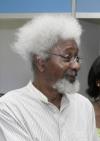Quotes by Wole Soyinka
- 1
- 2
I found, when I left, that there were others who felt the same way. We'd meet, they'd come and seek me out, we'd talk about the future. And I found that their depression and pessimism was every bit as acute as mine.
Power is domination, control, and therefore a very selective form of truth which is a lie.
Very conscious of the fact that an effort was being made to destroy my mind, because I was deprived of books, deprived of any means of writing, deprived of human companionship. You never know how much you need it until you're deprived of it.
But left with nothing to do except my own resources, I found myself going back and recollecting those mathematical formulas, geometric and algebraic, which I'd loathed in school, and now reworking them, reinventing them, rediscovering them and finding a logic to them.
I was placed in solitary confinement for a year and ten months out of the period in which I stayed in prison, which was just over two years.
See, even despite pious statements to the contrary, much of the industrialized world has not yet come to terms with the recognition of the fallacy of what I call the strong man syndrome.
But the ultimate lesson is just sit down and write. That's all.
I don't really consider myself a novelist, it just came out purely by accident.
Well, first of all I'll say that I come alive best in theater.
Well, I was thoroughly surrounded and immersed in aspects of the Yoruba culture.
There are different kinds of artists and very often, I'll be very frank with you, I wish I were a different kind.
I'm not one of those writers I learned about who get up in the morning, put a piece of paper in their typewriter machine and start writing. That I've never understood.
When I first came out - I spoke just now about this need for human company, but after I first came out, I remember that after a few days I just couldn't stand so much company. It became too much again for me and I couldn't wait until I could go away and isolate myself somewhere.
I was constantly surrounded, I recall, by aunts, uncles, my father's intellectual companions, all of them raconteurs of some sort or the other.
That was the first time I went into voluntary exile and that act was to distance myself from an environment which I felt had failed to come to grasp with the significance of the civil war, its immorality, and the future consequences. In other words, everybody had a sense of euphoria.
Theater can respond immediately.
I grew up in an atmosphere where words were an integral part of culture.
The novel, for me, was an accident. I really don't consider myself a novelist.
But when you're deprived of it for a lengthy period then you value human companionship. But you have to survive and so you devise all kinds of mental exercises and it's amazing.
Even when I'm writing plays I enjoy having company and mentally I think of that company as the company I'm writing for.
- 1
- 2






